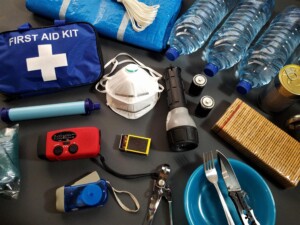
Many people used to make fun of preppers. After the COVID pandemic lock down of 2020, not so much. In previous times, preppers have often been looked at with ridicule and as “Dooms Day” paranoids. One of the oddest moments during COVID was when there was a toilet paper shortage, which is not really an essential item compared to water, food, medicine or emergency shelter and repair supplies. Instead, nowadays some of you may be secretly grateful if you have a MacGyver kind of neighbor with a generator and construction materials. And with a looming banking crisis, having items for trade may be more useful than a wad of single dollar bills.
Unless someone is fairly organized with their prepping efforts, it may end up as a disorganized mess and cost you extra time and money to manage. And if a person or family already has clutter or hoarding tendencies, the prepping option is its own disaster waiting to happen. This is one reason why it is ideal to do your prepping before the emergency occurs, if for no other reason than to take your time and have things well-thought out.
What is a prepper? A “prepper” is a person who prepares for any sort of disaster. It could be a natural or man-made disaster. It could be a local, regional, national or global disaster, where different items need to be gathered to suit the situation. However, there can be an overlap in what you need for any emergency, such a water and food.
There is plenty of information on the internet that you can search for, and prepare for specific disasters (like an earthquake compared to a fire evacuation). You could plan on food shortages, the inability to heat or cook food, how to survive for X-amount of time without electricity, plumbing and other scenarios.
Just when it comes to food alone, it is best to be organized so that you can rotate and actually use the canned goods you buy, before they expire. You can imagine what it would be like to eat only canned or dehydrated food for a number of days, weeks or months. This is one reason why I have a mixture of emergency foods. I do have a couple of containers of those survival foods with a shelf life of 25 years. But I also have canned foods which don’t require additional water or cooking in order to eat. Even though I am a fresh-food person in my ordinary life, if I had to eat canned pineapple, spinach and Trader Joes turkey chili to get through a day, I would.
The essence of this article is to emphasize that whatever you do to prepare for an emergency, have an order to your plan. If you buy batteries, get a battery tester and test your batteries yearly. And put the flash lights next to the batteries. In-sync with the topic of lighting, you may also want to store candles near the batteries.
If you get dehydrated food, also get a hibachi stove or an outdoor grill and plenty of water not just for drinking, but also for cooking and re-hydrating food. Don’t forget a bag of charcoal briquettes.
If you get canned food, organize the cans according to both contents and expiration dates, such as a whole shelf dedicated to a certain year of expiration and another shelf for another year of expiration.
If you have certain non-food survival supplies like matches, rope, hammer, and nails– then place them near each other.
I always keep a couple months’ worth of pet food on hand as well.
I could give many examples, but the last thing you want is to find yourself in an actual emergency, but not know where various things are located. This is a reason to write things down, such as labeling cabinets and shelves and then write down what is stored in each location on a master list. This is also another reason to be organized in general, so that you can keep track of ordinary items and not run out of anything for when everyday things like toothpaste, or toilet paper, may be out of stock.
More so during an emergency than in our everyday routines, you want your supplies to be accessible and inventoried so that the stress of the situation is not compounded by your inability to locate the things you need.
Author: Kartar Diamond
Company: Feng Shui Solutions ®
From the Tao of Organizing Blog Series
